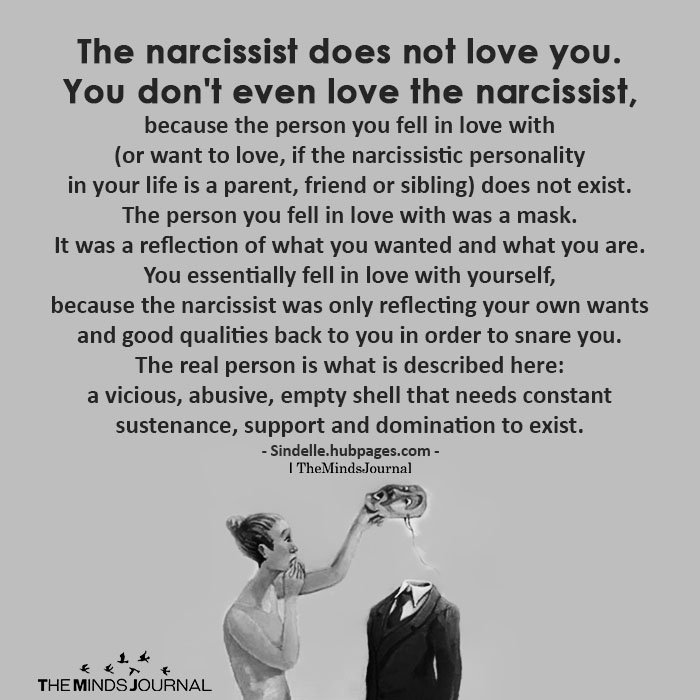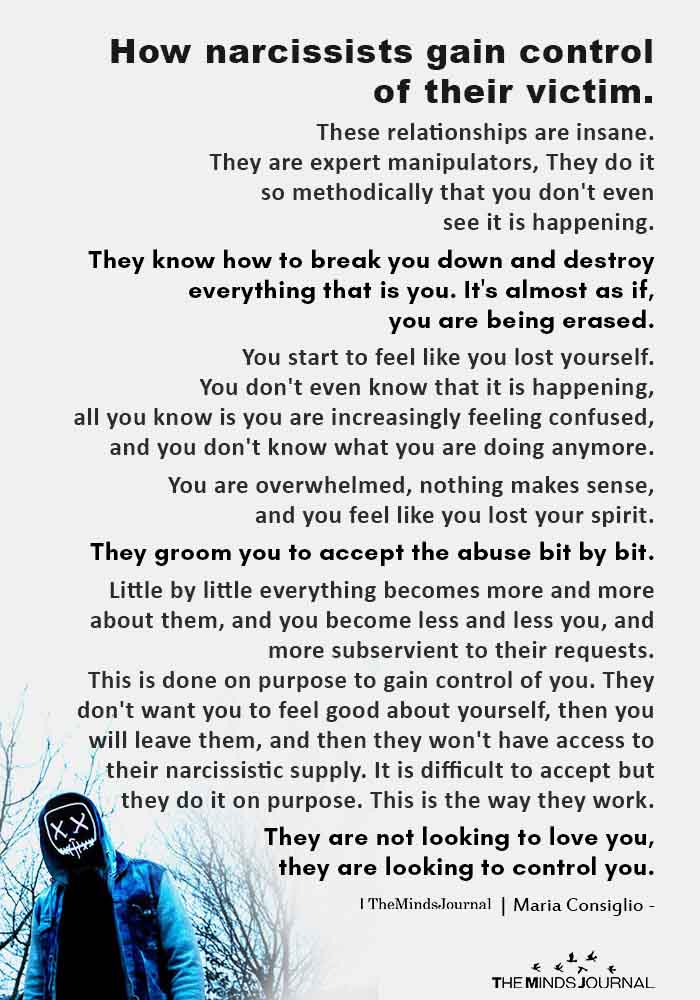Narcissists thrive on abuse and their favorite pastime is to abuse people, be it mentally or emotionally. The only one they care about is themselves, and the only things they care about are what THEY need.
How the cycle of abuse works
How a narcissist plays you. How a narcissist makes you feel.
A narcissist may love bomb you when you first meet them. They can be intense, all over you, telling you things that make you feel loved.
I’ve never met anyone like you before. You’re the person I’ve been waiting for.
They sweep you off your feet and promise you the world – marriage, babies, a perfect future together. Whatever it is you need to hear.
How a narcissist makes you feel
How a narcissist makes you feel at first – special wanted, great.
It’s like fireworks have gone off, it’s the best drug. You feel so high in their presence, their charisma sucks you in.
Once they’ve hooked you in, bad behavior creeps in, just little signs at first.
“How starved you must have been that my heart became a meal for your ego.” — Amanda Torroni
Related: 9 Clever Mind Games Narcissists Play In Relationships
Narcissistic game playing
They may erupt in anger out of the blue. A flash of anger, where they turn on you and say something nasty.
It’s subtle at first and so quick, but it’s over with just as fast.
You think you’ve imagined it, especially when they’re now saying: I’m so sorry, that’s not me.
They’re remorseful and they may even put it down to their difficult past. They tell you how hard done by they are; unlucky in love or life.
You then feel a bit sorry for them, so you forgive them. You believe that this behavior was uncharacteristic and not them.
But, then you start to see these flashes of anger more and more and they get worse each time.

Psychological games narcissists play
If you question them, they make excuses and tell you why it’s not their fault. If it’s not their bad past, it’s something you’ve done.
You made me angry. You shouldn’t have said that about me in front of your friends.
Whatever it is, they’ll find a reason to blame everything or everyone else, but them.
Or they might just disappear. They may go into a rage, throw things or smash their fist into a wall and then walk out the door. You won’t see them for a few days and will wonder: What have I done?
They’ll reappear and it will be as if nothing has happened. If you bring it up, you’ll be at fault for trying to create a problem in your relationship.
Why are you being so cold when I’m am so loving?
Narcissists test your boundaries early on, to see what you will accept.
Did she (or he) walk out of the relationship as a result of that behavior? No, they stuck around.
They see that as a license to reveal more of their darker side. It’s always excused away, blamed on someone else – usually you.
You start to change your behavior because you think:
Maybe I did say something wrong because they were so loving before.
You change it, hoping that by doing so you’ll affect the outcome and it won’t happen again.
But nothing works. So, you start twisting yourself in knots. You’ll do everything you can not to provoke them and to keep the peace. All you want is that loving side of them.
The pattern repeats and the abuse continues, followed by remorse and blame.
You may start to see the first signs of physical violence. A push or a shove. They may throw you hard up against a wall or pull your hair.
But, again they explain it away.
I only pushed you a little. It wasn’t as bad as you’re making out.
They may become so remorseful and upset, crying: I’m so sorry. I can’t believe I just did that. I don’t want it to turn out like my father who was violent.
You start to feel sorrier for them, more than for yourself and the abuse you’ve just suffered.
They’re testing your boundaries. If you accept their promises to never do that again, they’ll know they’ve got away with it and can do it again.

The cycle of abuse has begun.
The highs you have with them can be so wonderful and intense, you feel amazing. But, it’s followed by this tension that builds until something triggers them to explode.
The lows get lower, the highs fewer and further between.
You’re always chasing that high, trying to find that good person again. You change your behavior, even more, believing if you do, you can get that nice side of them again.
You’re forever trying to change, fix things, and make peace again.
All the while, they are stripping you of your self-esteem. To the point where you start to believe you’re worthless.
They convince you that you deserve this abuse, that it’s your fault.
You start to accept more than your fair share of responsibility for that relationship. You are taking responsibility for their actions and behavior. They’re blaming you and you’re starting to believe them.
Related: Ever Worry You Might Be the Narcissist in Your Relationship?
The Cycle of Abuse is Hard to Break From
This cycle of abuse is pervasive and hard to break free from. Not least because they also use manipulative tactics such as:
1. Gaslighting – where they tell you that you imagined their abuse. You’re too sensitive or you’re exaggerating it.
2. Mirroring – where they project onto you their own toxic behavior. They say you’re the one creating drama when it’s them.
This is manipulative behavior.
By the time you realize you’re in an abusive relationship, your self-esteem is so low. It’s almost impossible to find the courage to leave.
You’ve also become dependent on them. Your abuser has made you feel so low, yet they can lift you back again with one hug and the words:
I’m so sorry, I love you.
This is what you are longing for and need to make you feel better. They trap you in this distorted and dysfunctional cycle of abuse. The person abusing you is the only person who can make you feel good again.
If any of this sounds familiar to you then I would urge you to get out. The longer you stay in the cycle of abuse the harder it is to leave.
I know because I’ve been there. Leaving an abusive relationship was one of the hardest things I have ever done in my life.
Get help and support because you can’t do it alone.
A lot of us stay in that cycle of abuse because we believe the loving person we always see after the abuse is the real them. They’re not this nasty abuser. It’s not their fault.
If we can just love them more, prove to them we are worthy, then we’ll get that wonderful person. They will love me and everything will be okay.
It’s a false hope and a false promise. You will only go on chasing that elusive first high you felt. It will never feel as high again.
We are also hoping for closure. For them to admit their bad treatment of us, accept responsibility and blame for it. Tell us they’re going to get help and are finally going to change.
You could be waiting forever for that to happen. You could also end up dying.
Two women are murdered every week by an intimate partner. Men are the victims of abuse too.
If you are in this cycle of abuse, please get help and support to get out now. The longer you stay, the harder it will be to find freedom.
Written by Vivian McGrath Originally appeared on Vivian McGrath













Leave a Reply